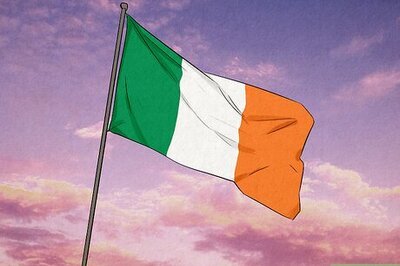
views
The morning after still feels good. The effusive prose, breathless platitudes and grateful tears that greeted Barack Obama as he was elected the 44th President of the United States of America don’t sound worn out yet. It is unlikely they will wear out for some time. There’s a good reason: America is half-sunk in a quagmire and is looking up to him as if he’s a pole to safety.
To get a sense of how bad things are, consider the legacy Obama’s predecessor, George Bush, is leaving behind: a ravaged economy that has pushed the rest of the world into recession and a remarkably naive foreign policy agenda that has stoked wars in Iraq and Afghanistan, catalysed simmering resentment in the Middle East, and has Russia, China, and large parts of Latin America and Europe seething. Sandwiched between the two problems is the American middle class, struggling to emerge from job losses, rising bills and falling asset values.
President George Bush famously told visitors to the White House just after the 9/11 attacks, to the eternal consternation of the rest of the world: “I don’t do nuance”. He plunged America into a mud pit without a single nuance indeed.
Therefore, it is tempting to imagine a post-American world where the superpower doesn’t figure. Where the brand of capitalism it exported to the world is wrapped up in rags; where the great American corporate role models such as AIG, GM and Merrill Lynch are just historical figures; and where the world no longer benchmarks wealth and influence to the brash individuals who ran Wall Street. Remember John Thain (Merrill Lynch), Richard Fuld (Lehman Bros) and John Mack (Morgan Stanley)?
To buttress the post-American hypothesis, consider the G-20 summit currently being hosted in Washington, DC. The New York Times reports that China is the most sought after country at a gathering many observers are calling Bretton Woods II. With close to $2 trillion in reserves and the muscle to pull other economies out of the dire straits they are in, China’s popularity shouldn’t surprise anybody.
Then there is oil-rich Saudi Arabia that British PM Gordon Brown is courting to infuse funds into the International Monetary Fund. Into this explosive cocktail, add French President Nicolas Sarkozy’s aspirations to lead a European renaissance on the global stage and it would seem America has finally been pushed into a corner.
But is that the truth? Between black and white, there are shades of gray. And looking at America through a monochromatic lens perhaps underestimates both the power and the resilience of the nation.
A tough nut of a nation
Writing off America is a risky proposition. “Despite appearances, America is one of the most capable countries in the world,” says Rahul Sagar, an expert in political science at Princeton University. “It handles governance in a manner few powers in history can rival.” Facts support his assertion.
Fareed Zakaria argues in his most recent book, The Post-American World: “Its economy has received hundreds of billions of dollars in investment—a rarity in a country with much capital of its own. GDP growth has averaged 3 percent for 25 years, significantly higher than Europe. Productivity growth has been over 2.5 percent, a full percentage point more than the European average. Since 1979, it has consistently emerged on World Economic Forum reports as the most competitive economy in the world.”
At the centre of any doom theory about the US is the argument that the dollar will concede its primacy as the globe’s reserve currency. History shows that the greenback has defied oblivion for several decades now, despite the fears. In 1990, only half of the world’s foreign exchange reserves were held in dollars. Today, the number stands at 63 percent. It is indeed a big hole in any argument that the Euro or Chinese Yuan are emerging as a credible alternative to the dollar. In any case, Europe is in recession and China doesn’t believe in a fully convertible currency. Writing an obituary to the American currency, therefore, would be premature and naive.
PAGE_BREAK
America’s ability to marshal global powers behind its own agenda is still unparalleled. As Jagdish Sheth of Emory University says, “Eventually, the rest of the world will rally behind Brand America.” The most recent precedent of the world toeing the American line happened a few hours after the World Trade Center attacks on September 11, 2001.
“Washington increased its defense budget by $50 billion—more than the annual defense budgets of Britain and Germany put together. In just a few weeks, it single-handedly put terrorism on top of the global agenda and compelled every country in the world to reorient its foreign policy,” Zakaria writes.
When looked at from this perspective, it becomes important to all of us in the rest of the world to understand what is top of mind in America right now. And that deep down, America is an incredibly paranoid nation.
Rethinking capitalism
When the former Soviet Union launched the Sputnik, it triggered panic in the US. The Americans fretted that they were losing their scientific edge. Eventually, they beat the Soviets and were the first to put a man on the moon. In the 1970s, when America stared at slow growth and high oil prices, policy makers imagined America was on the brink of losing its economic pre-eminence to Western Europe and Saudi Arabia. Again, in the 1980s, it was widely believed that America would concede ground to Japan.
Writes Zakaria in his book: “None of these scenarios came to pass… The economic dysfunctions in America today are real, but by and large, they are not the product of deep inefficiencies within the American economy, nor are they reflections of cultural decay. They’re the consequences of specific government policies.”
To get a sense of the issues here, consider this number. Until very recently, a staggering 30 percent of corporate America’s profits were accounted for by Wall Street. By all accounts, the number is an obscene one. To middle class Americans, the crisis they are currently grappling with is the outcome of policies that created huge wealth for a few at the expense of many over the last few years.
The question now is, how does America deal with the capitalism it has sold to the world, but has found to be problematic in its own backyard? Responding to the question on his campaign trail, Obama said: “I do not believe that government should stand in the way of innovation or turn back the clock to an older era of regulation. But I do believe that government has a role to play in advancing our common prosperity, by providing stable macroeconomic and financial conditions for sustained growth, by demanding transparency and by insuring fair competition in the marketplace. Our history should give us confidence that we don’t have to choose between an oppressive government-run economy and a chaotic and unforgiving capitalism.”
How that view translates into the policy making apparatus will be interesting to watch. A key Obama aide, who did not wish to be named, offered a few pointers on what may happen when the new administration takes charge: “More dollars will be given to banks on credit. I won’t be surprised if the government buys equity in certain large banks by giving them money so that small businesses can get credit. Expect tax cuts for the middle class.
“The financial architecture of the country will come under intense scrutiny. Lot more control, more regulation and more accountability. Corporate governance will come into the picture. It will be passed in Congress very quickly.”
Rahul Sagar of Princeton University alludes to a similar future: “By virtue of the recession, we are likely to see a less brash form of capitalism for a few years. Every crisis sparks a period of repentance before human greed returns to dominate.”
But that is precisely the kind of thinking that has another set of experts worried. “Barack Obama’s campaign has been long on slogans and mood music but short on concrete proposals and policies,” wrote political economist Willem Buiter in the London-based Financial Times. The London School of Economics professor argued that “Obama’s proposals are reactionary, populist, xenophobic and just plain silly.”
PAGE_BREAK
The concerns voiced by Buiter find precedents in the economic policies that followed the Great Depression in the 1930s. Thomas Cooley of the Stern Business School wrote in Newsweek: “The period was marked by an unprecedented increase in government intervention that substantially distorted markets and reduced economic well being… Many economists have concluded that these policies were responsible for keeping unemployment well above 10 percent until World War II…”
There is yet another danger, says Arun Maira, senior advisor with Boston Consulting Group (BCG), India: “Whenever there is a need to make things happen faster, or scale up good work, we think of putting someone in charge…Consequently, we tend to rely on the cult of the charismatic CEO and rely on simplistic measures like GDP.”
“The problem with this approach,” says Maira, “is that the right action to address the major problems confronting the world are not obvious…Bold fixes often backfire because the systemic connections among a variety of interacting forces are not clearly understood.”
Paul Martin, former Canadian prime minister, in an interview to Foreign Policy, dwells further on the argument: “There was a clear failure of surveillance and regulation in the United States. That was a domestic failure, coupled with a failure to understand the complete seamlessness of the global financial system. When somebody who can’t afford it buys a high-priced home in California and subsequently defaults, a continent away a small municipality in Norway goes broke. Misunderstanding that connectedness was a failure on behalf of all of those who were involved, certainly in Europe and the United States.”
It seems entirely likely these thoughts have already crossed the minds of people on Team Obama as they grapple with the more immediate task of transitioning to the White House and putting together a crack team to deal with the problems on hand. What the world needs to know is how America and Obama navigate the tricky ground that lies between the hope he sold and the demands that reason places.
Rethinking innovation
But America didn’t build its dominance exclusively on the back of economic might and capitalism, which it exported to the rest of the world. It also has its scientific and technological prowess, which much like capitalism in the country, is going through its own gut-wrenching moments.
Sometime in 2005, a high-powered committee tabled a report in the US Congress. It contained a few startling numbers that invoked mass hysteria and an enormous amount of breast-beating.
Sample some numbers from the report:
- Just about 6 percent of US undergraduate students take up science and engineering. As against this, 12 percent in Europe do. Singapore reports 20 percent. And China, a very impressive 40 percent.
- Nearly 38 percent of people who hold doctorates in the American science and engineering workforce are foreign-born, as compared to 24 percent in 1990. Two years from now, studies indicate American numbers will fall to about 15 percent.
“The US is like a frog that is slowly boiling in water. It doesn’t jump out because it doesn’t notice it is about to die,” Steven Chu, director at the Lawrence Berkeley National Laboratory in California, was reported as saying. A prominent American senator was equally outraged. “We’re on track to a second rate economy and a second rate country,” he thundered.
The numbers have since been dissed. Consider India, a country whose engineering workforce America seems terrified of. Every year, India produced anywhere between 35 to 50 engineers with a doctorate in computer science. America produces 1,000.
When it comes to industries of the future, say, nanotechnology, America’s dominance is insurmountable. It has more nano centres than the next three competing nations (Germany, UK and China) put together. More than $3.3 billion in venture capital funding went to US biotech companies in 2005.
PAGE_BREAK
European companies received barely half that amount. Not surprisingly, US biotech revenues approached $50 billion that year, five times greater than those in Europe, and represented 76 percent of global revenues.
But it did little to calm the hysteria—so much so that it soon morphed into an issue on the presidential campaign agenda that spilt over into the contentious issue of immigration. “This is clearly an opportunity for the next president to do something,” Vivek Wadhwa of the Pratt School of Engineering argues.
The H1B visa for instance, is an example of a policy that will come under the scanner. It brings in talented people, but only for the short term. In the longer run, it leaves the US weaker because talented people eventually have to leave. From a policy perspective, Obama and his advisors have argued this will have to change. What it means is simple. If more immigrants are needed to keep the engines of American innovation moving, open the damn doors.
The same can hardly be said of Europe, Japan, China, or for that matter any other significant global power.
Rethinking the world
“The day I’m inaugurated, not only will the country look at itself differently, but the world will look at America differently,” Obama said on the campaign trail. “Leaders of others countries will know that I’ve got family members that live in small villages in Africa that are poor and I know what they’re going through.” Coming from a presidential candidate, it was a remarkable statement.
But that said, most American foreign policy observers believe the nation has enough problems on hand that will keep America away from international affairs. Says Sandeep Waslekar of the Strategic Foresight Group, a think tank that advises the Indian government on key issues: “At best, US foreign policy will be conciliatory. For the next two years, it will have to focus on the domestic economy, not international politics.”
The view is echoed by Stephen Walt at the Kennedy School of Government in Harvard: “It won’t be feasible for the US to be as active internationally as it was under the Bush and Clinton regimes. It needs to be more cautious. In fact, cautious is not quite the right word—I would say it needs to take greater care and calculation of what is vital to US interests.”
So what does ‘cautious’ mean exactly? Jagdish Sheth of Emory University points to the many relationships that have gone through the shredder in the George Bush years. The biggest change, he reckons, is likely to come in America’s relationships with Russia and China.
From America’s perspective, writes Zakaria, the single largest challenge it faces is building a viable interface with both these countries and including them as stakeholders in the global economic and political order “…because they are large and have different political systems and ideological approaches to the world. Yet the benefits of having them inside the tent are obvious.”
“Then there is all of Latin America,” continues Seth. “The biggest alienation has happened in Latin America. Brazil is a big one. Bolivia. Venezuela. There are many fences to be mended.”
“But, on the whole,” says Rahul Sagar, “one should refrain from hoping for great idealism. It is easy to get overwhelmed by the moment. But America will continue to put America first. Obama is America’s president; he is not here to save the world.”
Liked the article? Download as PDF



















Comments
0 comment